广西普通高考英语听力口语考试(二级) 课件(46张ppt)
文档属性
| 名称 | 广西普通高考英语听力口语考试(二级) 课件(46张ppt) |

|
|
| 格式 | pptx | ||
| 文件大小 | 1.1MB | ||
| 资源类型 | 教案 | ||
| 版本资源 | 通用版 | ||
| 科目 | 英语 | ||
| 更新时间 | 2023-02-07 18:37:41 | ||
图片预览

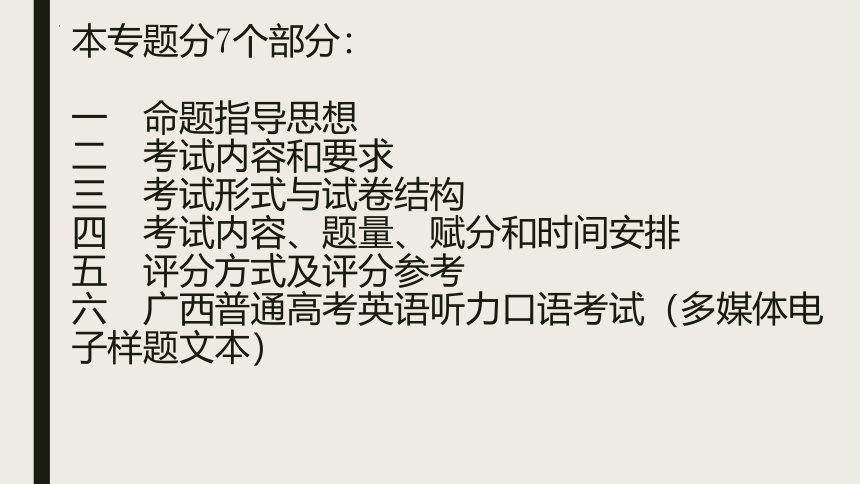
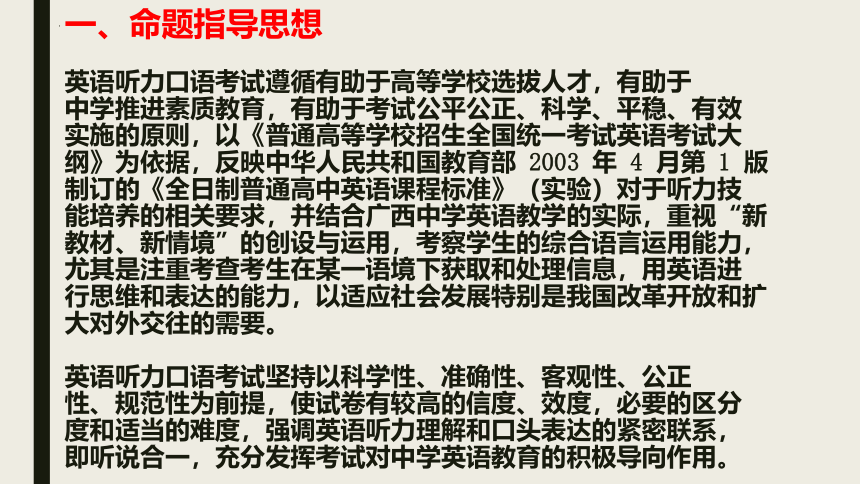
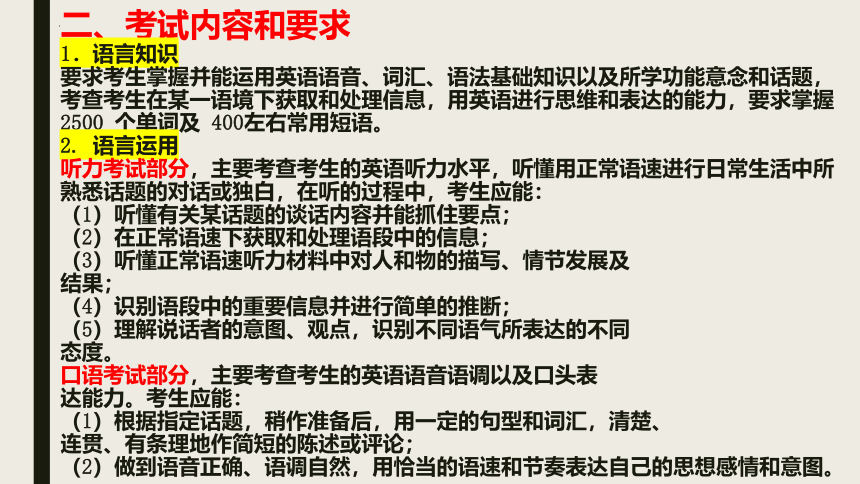
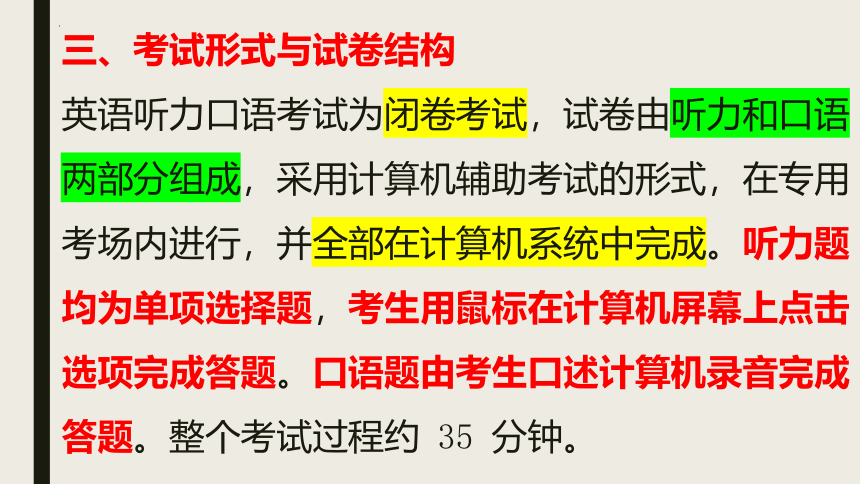
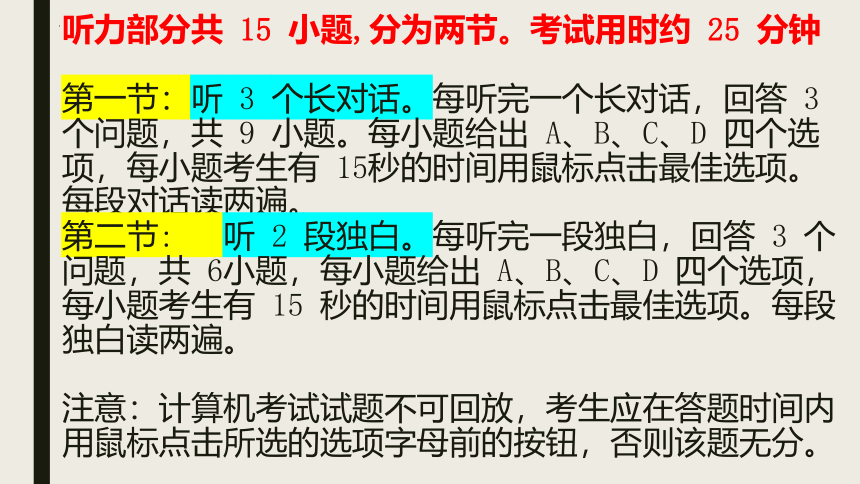
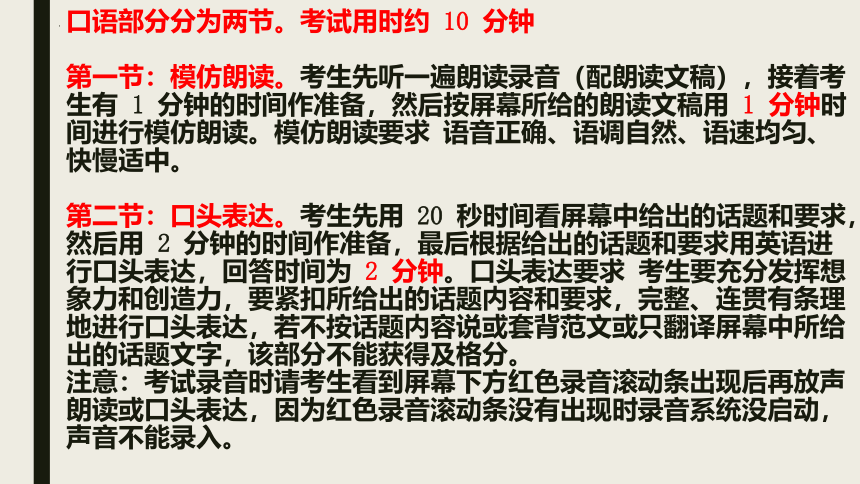
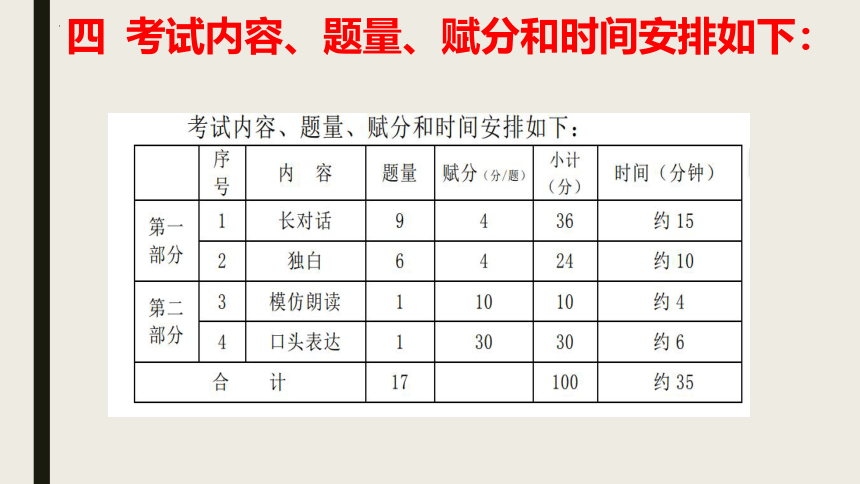
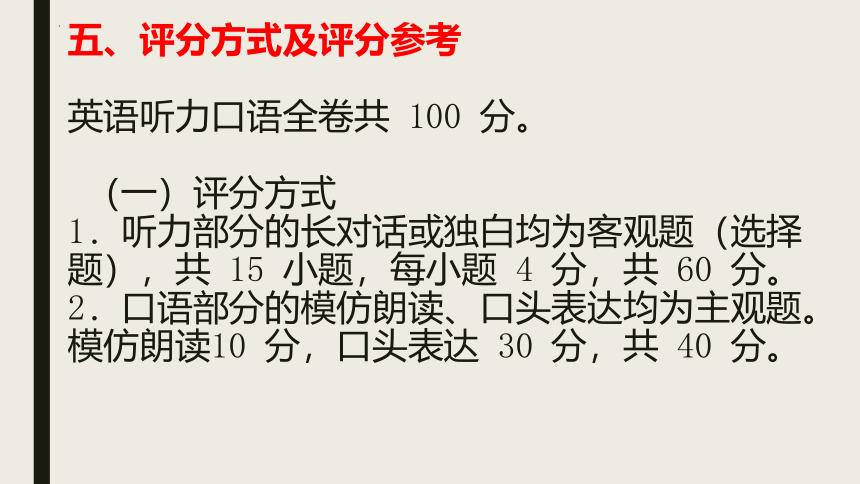
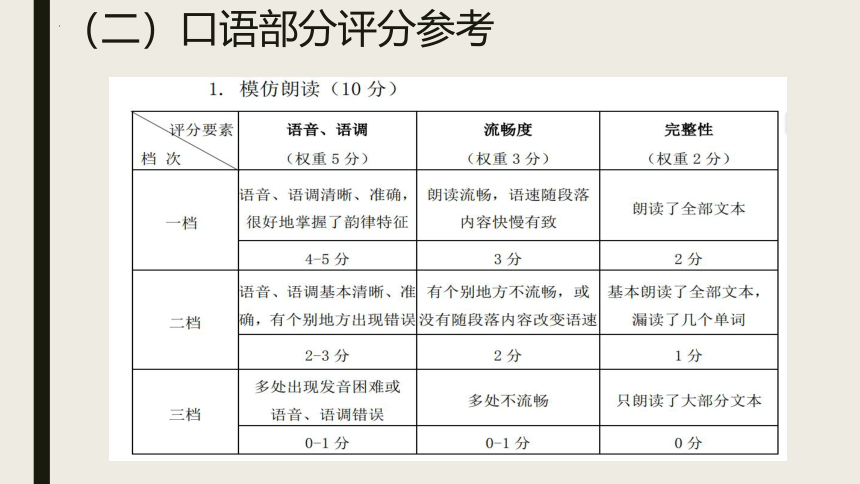
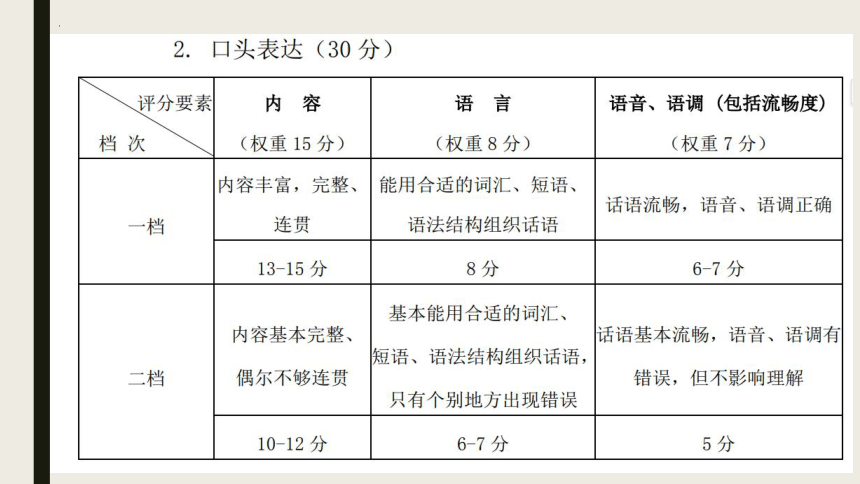
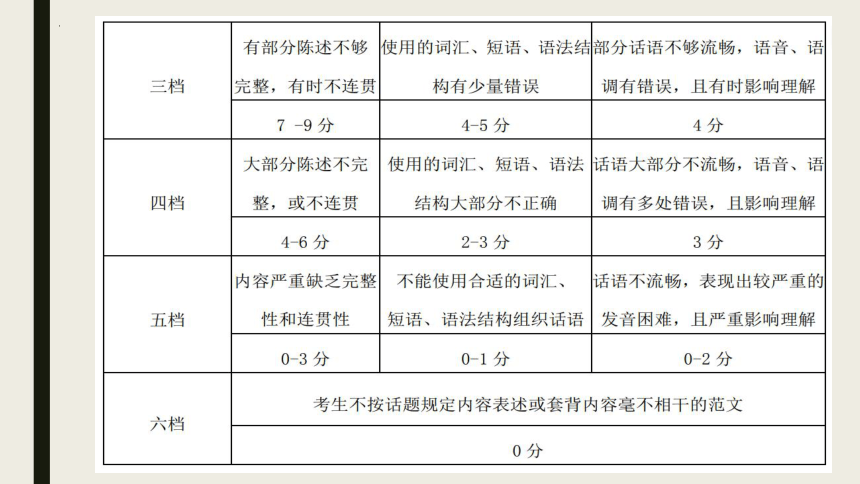
文档简介
(共46张PPT)
广西普通高考英语听力口语考试
专题研究
本专题分7个部分:
一 命题指导思想
二 考试内容和要求
三 考试形式与试卷结构
四 考试内容、题量、赋分和时间安排
五 评分方式及评分参考
六 广西普通高考英语听力口语考试(多媒体电子样题文本)
一、命题指导思想
英语听力口语考试遵循有助于高等学校选拔人才,有助于
中学推进素质教育,有助于考试公平公正、科学、平稳、有效
实施的原则,以《普通高等学校招生全国统一考试英语考试大
纲》为依据,反映中华人民共和国教育部 2003 年 4 月第 1 版
制订的《全日制普通高中英语课程标准》(实验)对于听力技
能培养的相关要求,并结合广西中学英语教学的实际,重视“新
教材、新情境”的创设与运用,考察学生的综合语言运用能力,
尤其是注重考查考生在某一语境下获取和处理信息,用英语进
行思维和表达的能力,以适应社会发展特别是我国改革开放和扩
大对外交往的需要。
英语听力口语考试坚持以科学性、准确性、客观性、公正
性、规范性为前提,使试卷有较高的信度、效度,必要的区分
度和适当的难度,强调英语听力理解和口头表达的紧密联系,
即听说合一,充分发挥考试对中学英语教育的积极导向作用。
二、考试内容和要求
1.语言知识
要求考生掌握并能运用英语语音、词汇、语法基础知识以及所学功能意念和话题,考查考生在某一语境下获取和处理信息,用英语进行思维和表达的能力,要求掌握 2500 个单词及 400左右常用短语。
2. 语言运用
听力考试部分,主要考查考生的英语听力水平,听懂用正常语速进行日常生活中所熟悉话题的对话或独白,在听的过程中,考生应能:
(1)听懂有关某话题的谈话内容并能抓住要点;
(2)在正常语速下获取和处理语段中的信息;
(3)听懂正常语速听力材料中对人和物的描写、情节发展及
结果;
(4)识别语段中的重要信息并进行简单的推断;
(5)理解说话者的意图、观点,识别不同语气所表达的不同
态度。
口语考试部分,主要考查考生的英语语音语调以及口头表
达能力。考生应能:
(1)根据指定话题,稍作准备后,用一定的句型和词汇,清楚、
连贯、有条理地作简短的陈述或评论;
(2)做到语音正确、语调自然,用恰当的语速和节奏表达自己的思想感情和意图。
三、考试形式与试卷结构
英语听力口语考试为闭卷考试,试卷由听力和口语两部分组成,采用计算机辅助考试的形式,在专用考场内进行,并全部在计算机系统中完成。听力题均为单项选择题,考生用鼠标在计算机屏幕上点击选项完成答题。口语题由考生口述计算机录音完成答题。整个考试过程约 35 分钟。
听力部分共 15 小题,分为两节。考试用时约 25 分钟
第一节:听 3 个长对话。每听完一个长对话,回答 3 个问题,共 9 小题。每小题给出 A、B、C、D 四个选项,每小题考生有 15秒的时间用鼠标点击最佳选项。每段对话读两遍。
第二节: 听 2 段独白。每听完一段独白,回答 3 个问题,共 6小题,每小题给出 A、B、C、D 四个选项,每小题考生有 15 秒的时间用鼠标点击最佳选项。每段独白读两遍。
注意:计算机考试试题不可回放,考生应在答题时间内用鼠标点击所选的选项字母前的按钮,否则该题无分。
口语部分分为两节。考试用时约 10 分钟
第一节:模仿朗读。考生先听一遍朗读录音(配朗读文稿),接着考生有 1 分钟的时间作准备,然后按屏幕所给的朗读文稿用 1 分钟时间进行模仿朗读。模仿朗读要求 语音正确、语调自然、语速均匀、快慢适中。
第二节:口头表达。考生先用 20 秒时间看屏幕中给出的话题和要求,然后用 2 分钟的时间作准备,最后根据给出的话题和要求用英语进行口头表达,回答时间为 2 分钟。口头表达要求 考生要充分发挥想象力和创造力,要紧扣所给出的话题内容和要求,完整、连贯有条理地进行口头表达,若不按话题内容说或套背范文或只翻译屏幕中所给出的话题文字,该部分不能获得及格分。
注意:考试录音时请考生看到屏幕下方红色录音滚动条出现后再放声朗读或口头表达,因为红色录音滚动条没有出现时录音系统没启动,声音不能录入。
四 考试内容、题量、赋分和时间安排如下:
五、评分方式及评分参考
英语听力口语全卷共 100 分。
(一)评分方式
1.听力部分的长对话或独白均为客观题(选择题),共 15 小题,每小题 4 分,共 60 分。
2.口语部分的模仿朗读、口头表达均为主观题。模仿朗读10 分,口头表达 30 分,共 40 分。
(二)口语部分评分参考
六:
广西普通高考英语听力口语考试
(多媒体电子样题文本)
欢迎参加英语听力口语考试。考试由听力和口语两部分组成。
听力部分分为两节,共 15 小题,均为单项选择题。第一节,3 段长对话。每段长对话后有 3 个小题,共 9 小题。第二节,2 段独白,每段独白后有 3 个小题,共 6 小题。
口语部分分为两节。第一节,模仿朗读。先听一遍短文录音,然后进行模仿朗读。第二节,口头表达。根据给出的话题及要求用英语进行口头表达。
听力部分:
第一节:听下面 3 段长对话。每段对话后有 3 个小题,从题中给出的 A、B、C、D 四个选项中选出最佳选项,并用鼠标点击该选项。听完每段对话后,各小题你有 15 秒钟的作答时间。每段对话读两遍。
请听第一段对话,回答第 1-3 小题:
1.How many flights are there from Luxemburg to Paris on Sundays
□ A. 2.
□ B. 3.
□ C. 4.
□ D. 5.
2. How long will the flight take from Luxemburg to Paris
□ A. One hour.
□ B. Two hours.
□ C. Three hours.
□ D. Four hours.
3. Which flight is at 7:40 on Sunday morning from Luxemburg to Paris
□ A. Flight LG 204.
□ B. Flight LG 203.
□ C. Flight LG 202.
□ D. Flight LG 201.
听力材料:
W: Hello, Luxair.
M: Hello, I’d like to know the times of Sunday flights, please, er…from Luxemburg to Paris.
W: From Luxemburg to Paris on Sundays
M: Yes, please.
W: Yes, well, at the moment we have two flights a day at weekends. And, er…you may care to know that we have four a day at weekdays.
M: Mmm.
W: Now, the first flight leaves at 7:40 a.m. and arrives at 8:40 a.m.
That’s flight number LG 201. And the second one, the evening flight,
leaves at 6:45 p.m. and arrives at 7:45 p.m. The flight number is LG
203.
M: Mmm…Thanks very much. And, erm…what is the airport of
arrival, please
W: Well. Er…all arrivals are at Poissy Charles de Gaulle in Paris.
M: Thank you very much.
W: Not at all.
M: Bye.
W: Bye.
4. What are the speakers talking about
□ A. The woman’s company.
□ B. The woman’s school life.
□ C. The woman’s manager.
□ D. The woman’s first job
5. What did the woman do after she left university
□ A. She worked for a marketing program.
□ B. She worked in a large company as a worker.
□ C. She worked as a trainee marketing manager.
□ D. She worked in different departments as a saleswoman.
6. Why did she enjoy her first job
□ A. Because it was exciting.
□ B. Because it was really practical.
□ C. Because she couldn’t find another job then.
□ D. Because it was a large international company.
听力材料:
M: Can you tell me something about your first job
W: Well, yes. It was with a large international company. They have a
trainee programme for people from university and, well, that was my
first job, trainee marketing manager.
M: What exactly did you do
W: Well, the programme lasted eighteen months. During that time I
worked in different departments – in personnel, purchasing,
marketing and such things. I also went out with the sales
representatives to visit customers.
M: Did you enjoy it
W: Yes, I did. I didn’t really know what I wanted to do when I left
university, so it was good to see what the different departments did. It
was really practical.
M: It sounds interesting.
W: Yes, it was. But it was very badly paid. I did the same work as
other people. I think a lot of the trainees feel they are a cheap source
of labour.
M: Would you do it again
W: Sure. I learnt a lot. And found out where I really wanted to work.
7. Why is Jack so tired
□ A. He was up all night drinking at a party.
□ B. He was up all night studying.
□ C. He got sick and is feeling tired all the time.
□ D. He just finished his last final this morning.
8. What does ‘cramming’ mean in this dialog
□ A. To drink as much as possible.
□ B. To pack things using one small bag.
□ C. To do last minute studying.
□ D. To have muscle pain from running too much.
9. Why are they going to meet on Saturday
□ A. Because the woman will help the man in Biology.
□ B. Because the man will help the woman in Chemistry.
□ C. To share notes in the history class.
□ D. To study together for the exams.
听力材料:
Woman: Hey Jack. You look tired. What's going on
Man: It's finals week and I have been up all night studying.
Woman: How many exams do you have left
Man: Three more to go
Woman: Have you been keeping up, or are you cramming everything
Man: If I was keeping up, I wouldn't need to stay up all night.
Woman: Ha ha ha. Looks like you are in for a tough week.
Man: Tell me about it. How about you What have you been up to
Woman: I finished my last final this morning.
Man: So you're completely done
Woman: No. I have one more report that is due this Friday. I haven't started it yet, but it shouldn't be too tough. If you need help with your chemistry class, I can help you over the weekend.
Man: That would be great.
Woman: Let's get together Saturday around lunch time.
Man: You don't know how much this means to me. Thanks.
Woman: Don't mention it. I'll see you on Saturday.
第二节:
听下面 2 段独白。每段独白后有 3 个小题,从题中给出的 A、B、C、D 四个选项中选出最佳选项,并用鼠标点击该选项。
听完每段独白后,各小题你有 15 秒钟的作答时间。每段独白读两遍。
请听第一段独白,回答第 10-12 小题:
10. What was Friday's weather like
□ A. sunny and windy.
□ B. warm and dry.
□ C. hot and cloudy.
□ D. cold and rainy.
11. What is Saturday evening's weather forecast
□ A. sunny skies for the whole evening.
□ B. light rain over the entire state.
□ C. heavy showers over the northern part.
□ D. some rain in parts of the state.
12. About what time should skies clear on Sunday
□ A. around 10:00 AM.
□ B. around 12:00 AM.
□ C. around 3:00 PM.
□ D. around 6:00 PM.
听力材料:
W: Well, for those of you who went out today, I don't have to tell you
it was clear, but muggy for most of the state, with the high temperatures in the low to mid 90s. The city of Elkview had the high for the day of 97 degrees. And that's hot. I'm glad I'm working indoors today!
For those of you planning outdoor activities tomorrow, you can expect sunny skies for most of Saturday with temperatures in the high 90's. However, things might change by Saturday evening with a storm front moving in. We can expect light scattered showers over the northern part of the state bringing slightly cooler temperatures in the eighties, but this rain should stop by mid Sunday morning. It will be partly cloudy for most of the morning, but these clouds should move out by mid-afternoon.
Skies should be clear Sunday night for those wanting to catch a
glimpse of the partial lunar eclipse. It should start at 10:47 pm. And
that's all for today's weather.
请听下面一段独白,回答第 13-15 小题:
3. What was mentioned about the woman’s primary school
□ A. The children were of the same age.
□ B. Her teacher was not so nice.
□ C. The classroom was very comfortable.
□ D. The school was nearby the village.
14. How long did the speaker stay in the primary school
□ A. 8 years.
□ B.7 years.
□ C. 6 years.
□ D. 5 years.
15. How did the woman think of her old friends
□ A. They didn’t understand her well.
□ B. They always supported her.
□ C. They changed a lot since she left the village.
□ D. They were jealous of her.
听力材料:
Things were very different then. In those days I used to live in a small
village in England. We were not rich, but we didn’t think of ourselves
as poor, either.
I started school when I was 5. There was only one teacher with about
30 children from 5 to 11.We all sat in the same room. It was very cold
in winter. We sat on hard wooden benches, and the teacher shouted at
us or even hit us if we didn’t pay attention.
In the evenings I used to do my homework and then sit with my
mother and younger brother in front of the fire, listening to the radio.
I liked reading, but I had very few books.
When I was 11, I started going to a secondary school in the nearest
town. Later I went to university, where I studied medicine. I was the
only person in the village to get a higher education. It was difficult
for me to go back to the village after that. I felt that there was a sort
of wall between myself and my old friends, and even my family. My
father couldn’t understand why I wanted an education.
口语部分
第一节:模仿朗读。先听一遍短文录音,接着你有 1 分钟的时间作准备,然后进行模仿朗读。
The beginning of my life was simple and much like every other little life. I came, I saw, I conquered, as the first baby in the family always does. There was the usual amount of discussion as to a name for me. The first baby in the family was not to be lightly named, everyone was emphatic about that. My father suggested the name of Mildred Campbell, and he declined to take any further part in the discussion. My mother solved the problem by giving it as her wish that I should be called after her mother, whose maiden name was Helen Everett.
第二节:口头表达。
针对以下话题进行口头表达。你有 2 分钟的时间作准备,然后进行 2 分钟的口头表达。
我们在日常的学习生活中,接受过各种形式的考试,请说出您应对考试的方法,内容包括:
(1) 您参加过哪些考试;
(2) 这些考试中您认为哪一场难度最大。
(3) 该场考试的经过和结果。
谢谢观看
祝考试顺利
广西普通高考英语听力口语考试
专题研究
本专题分7个部分:
一 命题指导思想
二 考试内容和要求
三 考试形式与试卷结构
四 考试内容、题量、赋分和时间安排
五 评分方式及评分参考
六 广西普通高考英语听力口语考试(多媒体电子样题文本)
一、命题指导思想
英语听力口语考试遵循有助于高等学校选拔人才,有助于
中学推进素质教育,有助于考试公平公正、科学、平稳、有效
实施的原则,以《普通高等学校招生全国统一考试英语考试大
纲》为依据,反映中华人民共和国教育部 2003 年 4 月第 1 版
制订的《全日制普通高中英语课程标准》(实验)对于听力技
能培养的相关要求,并结合广西中学英语教学的实际,重视“新
教材、新情境”的创设与运用,考察学生的综合语言运用能力,
尤其是注重考查考生在某一语境下获取和处理信息,用英语进
行思维和表达的能力,以适应社会发展特别是我国改革开放和扩
大对外交往的需要。
英语听力口语考试坚持以科学性、准确性、客观性、公正
性、规范性为前提,使试卷有较高的信度、效度,必要的区分
度和适当的难度,强调英语听力理解和口头表达的紧密联系,
即听说合一,充分发挥考试对中学英语教育的积极导向作用。
二、考试内容和要求
1.语言知识
要求考生掌握并能运用英语语音、词汇、语法基础知识以及所学功能意念和话题,考查考生在某一语境下获取和处理信息,用英语进行思维和表达的能力,要求掌握 2500 个单词及 400左右常用短语。
2. 语言运用
听力考试部分,主要考查考生的英语听力水平,听懂用正常语速进行日常生活中所熟悉话题的对话或独白,在听的过程中,考生应能:
(1)听懂有关某话题的谈话内容并能抓住要点;
(2)在正常语速下获取和处理语段中的信息;
(3)听懂正常语速听力材料中对人和物的描写、情节发展及
结果;
(4)识别语段中的重要信息并进行简单的推断;
(5)理解说话者的意图、观点,识别不同语气所表达的不同
态度。
口语考试部分,主要考查考生的英语语音语调以及口头表
达能力。考生应能:
(1)根据指定话题,稍作准备后,用一定的句型和词汇,清楚、
连贯、有条理地作简短的陈述或评论;
(2)做到语音正确、语调自然,用恰当的语速和节奏表达自己的思想感情和意图。
三、考试形式与试卷结构
英语听力口语考试为闭卷考试,试卷由听力和口语两部分组成,采用计算机辅助考试的形式,在专用考场内进行,并全部在计算机系统中完成。听力题均为单项选择题,考生用鼠标在计算机屏幕上点击选项完成答题。口语题由考生口述计算机录音完成答题。整个考试过程约 35 分钟。
听力部分共 15 小题,分为两节。考试用时约 25 分钟
第一节:听 3 个长对话。每听完一个长对话,回答 3 个问题,共 9 小题。每小题给出 A、B、C、D 四个选项,每小题考生有 15秒的时间用鼠标点击最佳选项。每段对话读两遍。
第二节: 听 2 段独白。每听完一段独白,回答 3 个问题,共 6小题,每小题给出 A、B、C、D 四个选项,每小题考生有 15 秒的时间用鼠标点击最佳选项。每段独白读两遍。
注意:计算机考试试题不可回放,考生应在答题时间内用鼠标点击所选的选项字母前的按钮,否则该题无分。
口语部分分为两节。考试用时约 10 分钟
第一节:模仿朗读。考生先听一遍朗读录音(配朗读文稿),接着考生有 1 分钟的时间作准备,然后按屏幕所给的朗读文稿用 1 分钟时间进行模仿朗读。模仿朗读要求 语音正确、语调自然、语速均匀、快慢适中。
第二节:口头表达。考生先用 20 秒时间看屏幕中给出的话题和要求,然后用 2 分钟的时间作准备,最后根据给出的话题和要求用英语进行口头表达,回答时间为 2 分钟。口头表达要求 考生要充分发挥想象力和创造力,要紧扣所给出的话题内容和要求,完整、连贯有条理地进行口头表达,若不按话题内容说或套背范文或只翻译屏幕中所给出的话题文字,该部分不能获得及格分。
注意:考试录音时请考生看到屏幕下方红色录音滚动条出现后再放声朗读或口头表达,因为红色录音滚动条没有出现时录音系统没启动,声音不能录入。
四 考试内容、题量、赋分和时间安排如下:
五、评分方式及评分参考
英语听力口语全卷共 100 分。
(一)评分方式
1.听力部分的长对话或独白均为客观题(选择题),共 15 小题,每小题 4 分,共 60 分。
2.口语部分的模仿朗读、口头表达均为主观题。模仿朗读10 分,口头表达 30 分,共 40 分。
(二)口语部分评分参考
六:
广西普通高考英语听力口语考试
(多媒体电子样题文本)
欢迎参加英语听力口语考试。考试由听力和口语两部分组成。
听力部分分为两节,共 15 小题,均为单项选择题。第一节,3 段长对话。每段长对话后有 3 个小题,共 9 小题。第二节,2 段独白,每段独白后有 3 个小题,共 6 小题。
口语部分分为两节。第一节,模仿朗读。先听一遍短文录音,然后进行模仿朗读。第二节,口头表达。根据给出的话题及要求用英语进行口头表达。
听力部分:
第一节:听下面 3 段长对话。每段对话后有 3 个小题,从题中给出的 A、B、C、D 四个选项中选出最佳选项,并用鼠标点击该选项。听完每段对话后,各小题你有 15 秒钟的作答时间。每段对话读两遍。
请听第一段对话,回答第 1-3 小题:
1.How many flights are there from Luxemburg to Paris on Sundays
□ A. 2.
□ B. 3.
□ C. 4.
□ D. 5.
2. How long will the flight take from Luxemburg to Paris
□ A. One hour.
□ B. Two hours.
□ C. Three hours.
□ D. Four hours.
3. Which flight is at 7:40 on Sunday morning from Luxemburg to Paris
□ A. Flight LG 204.
□ B. Flight LG 203.
□ C. Flight LG 202.
□ D. Flight LG 201.
听力材料:
W: Hello, Luxair.
M: Hello, I’d like to know the times of Sunday flights, please, er…from Luxemburg to Paris.
W: From Luxemburg to Paris on Sundays
M: Yes, please.
W: Yes, well, at the moment we have two flights a day at weekends. And, er…you may care to know that we have four a day at weekdays.
M: Mmm.
W: Now, the first flight leaves at 7:40 a.m. and arrives at 8:40 a.m.
That’s flight number LG 201. And the second one, the evening flight,
leaves at 6:45 p.m. and arrives at 7:45 p.m. The flight number is LG
203.
M: Mmm…Thanks very much. And, erm…what is the airport of
arrival, please
W: Well. Er…all arrivals are at Poissy Charles de Gaulle in Paris.
M: Thank you very much.
W: Not at all.
M: Bye.
W: Bye.
4. What are the speakers talking about
□ A. The woman’s company.
□ B. The woman’s school life.
□ C. The woman’s manager.
□ D. The woman’s first job
5. What did the woman do after she left university
□ A. She worked for a marketing program.
□ B. She worked in a large company as a worker.
□ C. She worked as a trainee marketing manager.
□ D. She worked in different departments as a saleswoman.
6. Why did she enjoy her first job
□ A. Because it was exciting.
□ B. Because it was really practical.
□ C. Because she couldn’t find another job then.
□ D. Because it was a large international company.
听力材料:
M: Can you tell me something about your first job
W: Well, yes. It was with a large international company. They have a
trainee programme for people from university and, well, that was my
first job, trainee marketing manager.
M: What exactly did you do
W: Well, the programme lasted eighteen months. During that time I
worked in different departments – in personnel, purchasing,
marketing and such things. I also went out with the sales
representatives to visit customers.
M: Did you enjoy it
W: Yes, I did. I didn’t really know what I wanted to do when I left
university, so it was good to see what the different departments did. It
was really practical.
M: It sounds interesting.
W: Yes, it was. But it was very badly paid. I did the same work as
other people. I think a lot of the trainees feel they are a cheap source
of labour.
M: Would you do it again
W: Sure. I learnt a lot. And found out where I really wanted to work.
7. Why is Jack so tired
□ A. He was up all night drinking at a party.
□ B. He was up all night studying.
□ C. He got sick and is feeling tired all the time.
□ D. He just finished his last final this morning.
8. What does ‘cramming’ mean in this dialog
□ A. To drink as much as possible.
□ B. To pack things using one small bag.
□ C. To do last minute studying.
□ D. To have muscle pain from running too much.
9. Why are they going to meet on Saturday
□ A. Because the woman will help the man in Biology.
□ B. Because the man will help the woman in Chemistry.
□ C. To share notes in the history class.
□ D. To study together for the exams.
听力材料:
Woman: Hey Jack. You look tired. What's going on
Man: It's finals week and I have been up all night studying.
Woman: How many exams do you have left
Man: Three more to go
Woman: Have you been keeping up, or are you cramming everything
Man: If I was keeping up, I wouldn't need to stay up all night.
Woman: Ha ha ha. Looks like you are in for a tough week.
Man: Tell me about it. How about you What have you been up to
Woman: I finished my last final this morning.
Man: So you're completely done
Woman: No. I have one more report that is due this Friday. I haven't started it yet, but it shouldn't be too tough. If you need help with your chemistry class, I can help you over the weekend.
Man: That would be great.
Woman: Let's get together Saturday around lunch time.
Man: You don't know how much this means to me. Thanks.
Woman: Don't mention it. I'll see you on Saturday.
第二节:
听下面 2 段独白。每段独白后有 3 个小题,从题中给出的 A、B、C、D 四个选项中选出最佳选项,并用鼠标点击该选项。
听完每段独白后,各小题你有 15 秒钟的作答时间。每段独白读两遍。
请听第一段独白,回答第 10-12 小题:
10. What was Friday's weather like
□ A. sunny and windy.
□ B. warm and dry.
□ C. hot and cloudy.
□ D. cold and rainy.
11. What is Saturday evening's weather forecast
□ A. sunny skies for the whole evening.
□ B. light rain over the entire state.
□ C. heavy showers over the northern part.
□ D. some rain in parts of the state.
12. About what time should skies clear on Sunday
□ A. around 10:00 AM.
□ B. around 12:00 AM.
□ C. around 3:00 PM.
□ D. around 6:00 PM.
听力材料:
W: Well, for those of you who went out today, I don't have to tell you
it was clear, but muggy for most of the state, with the high temperatures in the low to mid 90s. The city of Elkview had the high for the day of 97 degrees. And that's hot. I'm glad I'm working indoors today!
For those of you planning outdoor activities tomorrow, you can expect sunny skies for most of Saturday with temperatures in the high 90's. However, things might change by Saturday evening with a storm front moving in. We can expect light scattered showers over the northern part of the state bringing slightly cooler temperatures in the eighties, but this rain should stop by mid Sunday morning. It will be partly cloudy for most of the morning, but these clouds should move out by mid-afternoon.
Skies should be clear Sunday night for those wanting to catch a
glimpse of the partial lunar eclipse. It should start at 10:47 pm. And
that's all for today's weather.
请听下面一段独白,回答第 13-15 小题:
3. What was mentioned about the woman’s primary school
□ A. The children were of the same age.
□ B. Her teacher was not so nice.
□ C. The classroom was very comfortable.
□ D. The school was nearby the village.
14. How long did the speaker stay in the primary school
□ A. 8 years.
□ B.7 years.
□ C. 6 years.
□ D. 5 years.
15. How did the woman think of her old friends
□ A. They didn’t understand her well.
□ B. They always supported her.
□ C. They changed a lot since she left the village.
□ D. They were jealous of her.
听力材料:
Things were very different then. In those days I used to live in a small
village in England. We were not rich, but we didn’t think of ourselves
as poor, either.
I started school when I was 5. There was only one teacher with about
30 children from 5 to 11.We all sat in the same room. It was very cold
in winter. We sat on hard wooden benches, and the teacher shouted at
us or even hit us if we didn’t pay attention.
In the evenings I used to do my homework and then sit with my
mother and younger brother in front of the fire, listening to the radio.
I liked reading, but I had very few books.
When I was 11, I started going to a secondary school in the nearest
town. Later I went to university, where I studied medicine. I was the
only person in the village to get a higher education. It was difficult
for me to go back to the village after that. I felt that there was a sort
of wall between myself and my old friends, and even my family. My
father couldn’t understand why I wanted an education.
口语部分
第一节:模仿朗读。先听一遍短文录音,接着你有 1 分钟的时间作准备,然后进行模仿朗读。
The beginning of my life was simple and much like every other little life. I came, I saw, I conquered, as the first baby in the family always does. There was the usual amount of discussion as to a name for me. The first baby in the family was not to be lightly named, everyone was emphatic about that. My father suggested the name of Mildred Campbell, and he declined to take any further part in the discussion. My mother solved the problem by giving it as her wish that I should be called after her mother, whose maiden name was Helen Everett.
第二节:口头表达。
针对以下话题进行口头表达。你有 2 分钟的时间作准备,然后进行 2 分钟的口头表达。
我们在日常的学习生活中,接受过各种形式的考试,请说出您应对考试的方法,内容包括:
(1) 您参加过哪些考试;
(2) 这些考试中您认为哪一场难度最大。
(3) 该场考试的经过和结果。
谢谢观看
祝考试顺利
